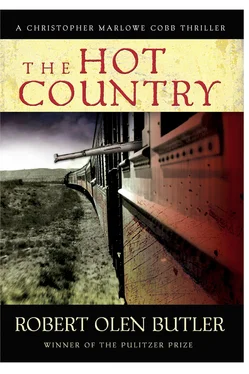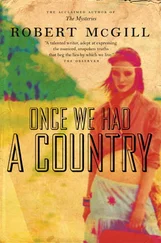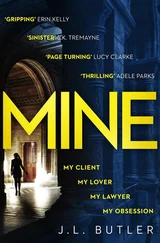But I needed to make things a little safer for myself now. I always did that by writing words. So I rolled a cable blank into my Corona Portable Number 3, which sat in the center of the desk. I could dash off quick stories by hand in the portales, but my real writing was done with my friend, my pal, my typewriter. He went to the Balkans with me. Before that he went to Nicaragua with me, when he was brand-new, new to me and new to the world. The marvel of the age, the six-pound Corona 3. With his carriage folding forward over the keyboard, he fit into a case smaller than a bread box. But he took my words and made them real.
I put my fingertips upon his keys and I would write my mother a cable.
I didn’t know what to say.
I knew many things that it would be useless to say. Advice and warnings and cajolings. Many things that she would sniff at or turn from or — if I were in her presence and said them — that would cause her to take a bit of my cheek between her thumb and forefinger and pinch it hard, very hard, even though I was thirty years old. “My Kit,” she would say, “my silly sweet Kit Cobb, mind your own bloody business.”
My fingertips sat on the keys for a long while until I thought to interpret for her a passage from my namesake. From his Jew of Malta . I wrote:
Dearest Mother. Though he freely admits to the friar that he hath committed fornication, Barabas, who if he were not a usurer would be a rowdy man, quite easily can say “But that was in another country, and besides, the wench is dead.” Take care you understand your unconventional audience. Love from your Kit
Sundown this same day and I’d filed my corpse-burning story and I’d sent my cable to Mother and I was at my table in the portales taking my first aguardiente slow. I was also wondering if we’d hear from our girl sniper again before the day was done. Bunky showed up and sat. He and I and all the other veteran newsmen had our routines now. Your little routines are a hedge against the madness of the job. But when it’s all routine and no madness, that’s the worst for a war correspondent, when you’re in a faux war and you end up trying to create stories out of something other than real battle that you’re in the middle of, stories without real artillery and real gunfire and the movement of troops and without men dying for causes or for politicians or for both. And yes, without the possibility of your own death right there at your elbow all the while.
“Evening, Pops,” I said.
“That going to become a habit?” he asked.
“The aguardiente at sundown?”
“Calling me ‘Pops.’”
“That was just the second time, I think.”
Bunky leaned toward me, which was his way of showing he was serious about something. “Twice in two days,” he said. “Three time’s a pattern. Four’s a habit. I thought I’d intervene now, if we were heading there.”
“‘Bunky’ then. Forever.”
“Bunky’s good.”
I found myself with an odd little twist in the stomach. I told myself it was the aguardiente, not this thing about “Pops,” but I took another drink to make sure the feeling went away, and it did.
“You find out about Davis and the sniper?” I said.
“He can be sly, but from all I can make out, he didn’t file a story.”
“He wouldn’t be sly on this one,” I said. “He probably just tucked it away as local color for a magazine feature.”
So Bunky and I drank for a little while, and I only half listened to his familiar monologue about the way the censors have ruined war, from a newspaper’s point of view, and if the government was going to lie, then the newspapers should also feel free to lie, though I knew Bunky didn’t mean that, and then I wasn’t listening to him at all so I could just drink aguardiente and not worry about a thing for an hour or two.
Before you knew it, the night had come upon us and the near-full moon was perched on the mountaintops, bloated and yellow, and the German band had been playing beyond the trees for quite a while already. Bunky had fallen silent, the effect of his own drinking. He’d gotten to his silent stage. And suddenly I was aware of the music in the air. I recognized Richard Wagner. Something from Lohengrin, I thought. Not that I’d been following their whole program carefully these past couple of nights, but this was the first German music I’d heard the German band play.
And then they played the Kaisermarsch, also Wagner. Mother had a fling in New York with a German orchestra conductor at some point when I was still around, and I got to know Wagner’s music a little too well for my taste. This piece honored a Kaiser of about forty years ago and usually had a German men’s chorus going Heil! Heil! dem Kaiser! The horns were doing that part from the band shell. And it struck me as odd, two German songs in a row all of a sudden, and I was on my feet and crossing the avenida .
I entered the zócalo. Up ahead, the band shell was lit by incandescent lamps. The rest of the Plaza was in darkness and the angle of the moon was still low, so we were all just dark shapes moving about or lined up on the benches. Only a few figures were standing in the light from the kiosko . Many of the moving figures were heading away from the music now. The concert was almost over, certainly, but these were not tunes for them.
That suspicion was what stood me up and brought me quickly here. And sure enough. Three figures were standing shoulder to shoulder in the light up ahead, apart from the locals, and as soon as I saw them I stopped, while I was still well-shrouded in the dark. I did not want to be seen by these three: Captain Krüger; a stout man in shirtsleeves, unfamiliar to me but who I’d have been willing to bet was the head of the consulate; and my man from the Ypiranga, the tall man with the fencing scar, wearing his white linen suit. They were standing stiffly, facing the Kaisermarsch as if they were all about to salute in unison. I moved off the path and leaned against a tree, effectively hidden now, though still able to observe.
The Kaisermarsch ended, and the three men did indeed touch their right temples in precise military salutes, the two apparent civilians as meticulously correct in the execution of the gesture as der Kapitän . They released the salute, and they stepped forward as the musicians began to put aside their instruments. The bandmaster came to the edge of the stand to greet them, and more salutes were exchanged. Krüger hung back a little as the two civilians worked the front edge of the bandstand like politicians, shaking hands with the musicians for a time.
When the three were done with all this, they bowed and saluted and made a fine Germanic fuss of respect for the whole band, and they turned and started up the path. I slid a little farther behind the tree as they strolled past, talking low, moving casually. I considered following them, but I was certain they would simply lead me back to the consulate. I looked toward the band shell. The musicians had known from sight to crank up the Fatherland’s Favorites. Krüger and the head of the consulate could easily have been familiar to them. But maybe the man with the scar was too.
They were all on their feet now, packing their instruments, at least some of them ready, I suspect, to head somewhere to drink. I figured I could do with a drink myself and maybe a little manly shoulder-clapping and drunken song-singing. I might even find a long-sought pal who knew something useful.
A few of the dozen or so band members headed off separately, and the rest stayed together till they got to Independencia . Then the group broke in two, with one part heading toward the portales and the other part, four of the musicians, including the bandleader and the alto horn player who seemed to recognize me, hopping a trolley south. It was an easy choice: I lagged behind the four, who boarded and moved to the front of the car, and I stepped up with the clang of the bell and I sat down at once on the right-hand, straw-seated, lateral bench. They were in twos now, facing each other on the opposing benches, talking volubly in German, their cased instruments standing on the floor between their feet. The alto man was pretty much out of sight, on my side of the car and beyond the trombonist. The bandmaster sat directly opposite him. I’d wait till we were all in the same place, drinking, to make a point of my presence.
Читать дальше












